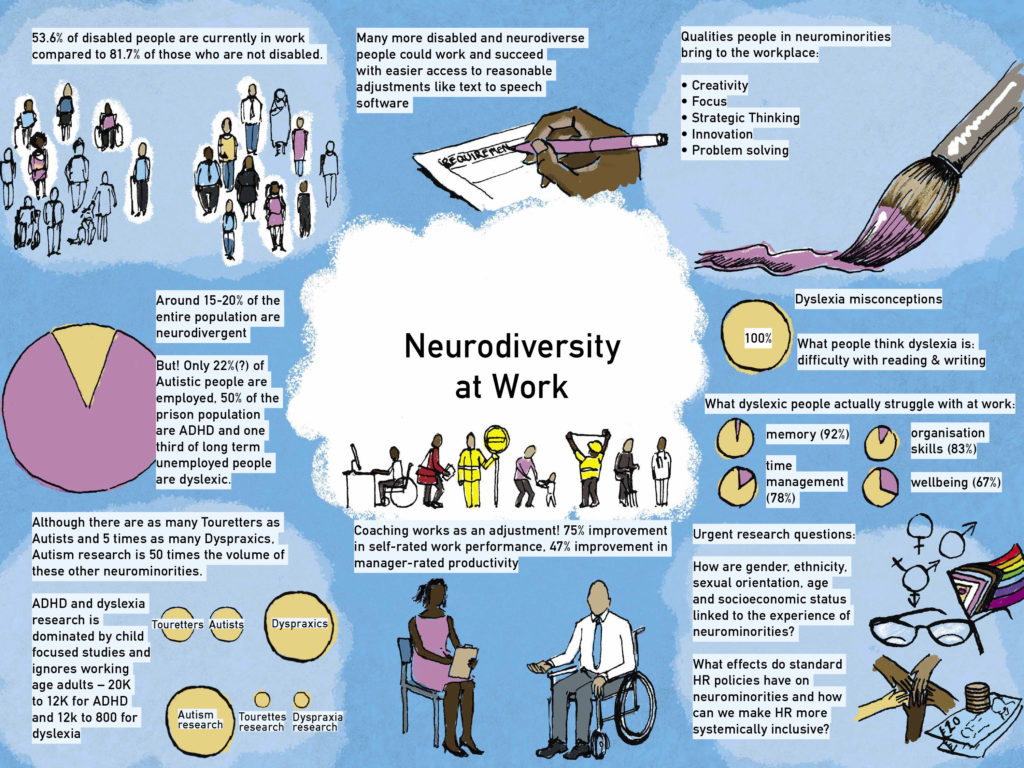This blog is a layperson summary of the paper Weber, C., Häne, E., Yarker, J., Krieger, B., & McDowall, A. (2022). Physical Workplace Adjustments to Support Neurodivergent Workers: A Systematic Review. Applied Psychology – An International Review.

Who are we?
We are a group of five researchers:
- Clara is an environmental psychologist at the Zurich University of Applied Sciences, where she researches how physical workplaces make people feel, think, and behave and reasons why.
- Eunji is part of Clara’s team and is a workplace management researcher, who figures out how offices can be better managed.
- Almuth and Jo are occupational psychologists at Birkbeck, University of London who research workplace health and diversity.
- Beate is an occupational therapy researcher at Zurich University of Applied Science looking at making the work environment better for young people with autism.
What is neurodiversity and neurodivergence?
- Neurodiversity means that humans are all different from each other with particular strengths and weaknesses. The different ways that humans feel, think and behave are associated with certain conditions;
- Neurodivergence describes when someone’s brain learns or behaves differently from what is considered ‘typical’. Not everyone likes this word, but we use it because we looked at research carried out on people with certain conditions. We use the two words interchangeably here for this reason.
What did we do?
- We looked at ‘physical workplace adjustments’ for neurodivergent workers. These adjustments are mostly ‘physical helpers’ that aim to make it more comfortable to work in an office.
- For example, if bright light in the office is hard to tolerate, you might prefer a different artificial light that you can also control or choose to use sunglasses.
- We wanted to know what research has been done, what physical helpers are used, and if they make a difference to people’s wellbeing;
- We confirmed if studies were trustworthy and of good quality;
- Finally, we confirmed where there are gaps in research.
We need this information to make recommendations and to guide future research.
Why did we do it?
- Research shows that neurodivergent people are excluded from work. Many experience difficulties finding or remaining in work because workplaces do not easily accommodate different needs;
- People who are neurodiverse often have unmet sensory needs in the workplace. This means that sounds, lights, the touch/feeling of things, or other people’s closeness can be too much. This can affect their health and work ability, with people commonly reporting headaches, feeling dizzy or sick;
- We need to know how to make workplaces healthy and productive environments for neurodiverse workers and what types of physical helpers are best;
- There is guidance from charities and advisory groups listing different physical helpers;
- Workplace design companies also offer various creative physical helpers, but they don’t say if these actually work. Little is known about how these helpers are tried and tested.
What did we do specifically?
We did a systematic review of the research evidence. A systematic review follows very specific rules and steps in order to find studies and make sense of their findings. By using this method, we developed a picture of all the available research in a specific area;
We looked for any studies that considered at least one physical helper used in an office. We included studies if this helper had anything to do with:
- how well people felt at work (health/well-being)
- how well people were able to work (performance)
- the extent to which people found it easier to stay in work (occupational longevity).
We searched academic literature and guidance documents from charities or advisory groups and:
- found 319 studies connected with our research topic/question. Of these, only 20 studies mentioned our particular focus;
- confirmed how trustworthy the results of the studies are. We rated the quality of their research design and reporting of information;
- grouped all the physical helpers and their positive effects to see at a glance what types have what kind of effect.
What have we found out?
- Few studies say anything concrete about links between these physical helpers and improved well-being, work ability or staying in a job;
- Many studies are based on interviews asking people about experience, rather than testing over time to see if physical helpers make a difference;
- No studies focused specifically on physical helpers. This means that studies only mentioned physical helpers if participants did so;
- Some studies report general helpful office adjustments such as altering light or desk placement (if available);
- No studies used strong, reliable research methods, meaning other researchers cannot test their findings by recreating them. Without robust studies, we cannot say anything about cause and effect;
- So far, we can mostly say that study participants believed that some helpers contributed to a good experience but we have no evidence that they actually work.
Why is this important?
- We urgently need more and better research;
- Neurodivergent workers are likely to be better able to access helpers if there is evidence that shows they make a difference;
- Organisations might be spending money on helpers which don’t help;
- Charity and other guidelines should acknowledge the evidence base for the accommodations they recommend so that people are aware of the basis for this advice;
- Developing a specification for return of investment would help researchers and organisations gather more data to inform our understanding of what works, for whom and when.



